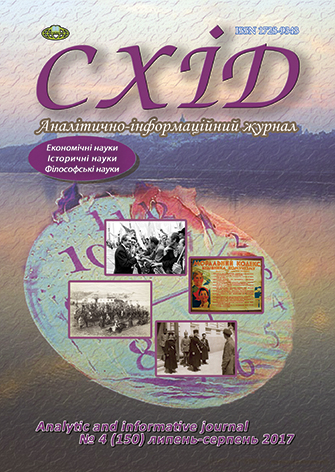The meaning of the concepts about the state of Silvester Kosov for the formation of the self-identification of the early modern Ukrainian nation
DOI:
https://doi.org/10.21847/1728-9343.2017.4(150).111265Keywords:
Sylvester Kosov, Ukrainian Orthodox Church, sovereign Ukrainian state, early modern Ukrainian nationAbstract
The article is devoted to the study of the views of the Metropolitan of Kiev Sylvester Kosov on the essence, structure and function of the ideal state. An attempt was made to determine how these views influenced the formation of the self-identification of the Ukrainian ethnos during its design in the early modern nation. It was found out that the state concept of S. Kosov was formed on the basis of scientific achievements of the scientific community of P. Mogila and was influenced by the Polish political ideology of the end of XVI - beginning of the XVII century. It is determined, that the nearest analogies particular concept had in the works of A. Kallonofyskiy and C. Copistensky. It is argued that one of the achievements of S. Kosov is the formulation of the ideologue of Kiev as the Second Jerusalem, which justified the political right to the sovereignty of the Ukrainian state. The political nation of that state considered to be the "people of Rus" as an ethnic community sharing the values of the baptism of Rus prince Volodymyr. The ruling elite of the ideal Ukrainian state considered the Orthodox gentry to be the metropolitan, and some of the functions of management recognized the Cossacks. The ideal ruler in the theory of S. Kosov was the "king-philosopher", endowed with wisdom and moral virtues. It was found out that S. Kosov one of the first introduced in the structure of self-identification of the Ukrainian nation the category of "antiquities" as the historical duration of the people, state and political elite.
S. Kosov's views had a serious impact on the formation of the self-awareness of the early modern Ukrainian nation and were partially implemented in the political activities of B. Khmelnytsky. However, there was a significant divergence between the ideology of the Orthodox clergy and the Cossacks, which became heightened later in the times of the Ruins.References
Zatylyuk, J.V. (2012), Ancient Russian history at the service of the KyivanChurchhierarchs in the middle - the second half of the XVII century: political rhetoric and the status of the metropolis, Ukrainian historical journal, Vol. 6, p.40-56 (ukr).
Kohut, Z. (2004), The Roots of Identity: Studies on Early Modern and Modern History of Ukraine, Krytyka, Kyiv, 352 p. (ukr).
Kryzhanivsky, O.P., Plokhiy, S.M. (1994), The history of the church and religious studies, Lybid’, Kyiv, 335 p. (ukr).
Mytsyk, Yu.A. (2007), Kyiv patriarchate in Petro Mohyla’s projects, Ukrainian historical journal, Vol. 1, pp. 61-69 (ukr).
Plokhiy, S. (2006), The faith of Nalyvayko. Cossacks and religion inUkraineof early modernism: monograph, Krytyka, Kyiv, 495 p. (ukr).
Sinkevich, N. (2013), “Patericon” of Syl’vestr Kosov: Translation and research of the monuments, Phoenix, Kyiv, 712 p. (ukr).
Khavrishin, M. (1995), Bohdan Khmelnytsky and Ukrainian orthodox church (1648-1657), Ukrainian historical journal, Vol. 4, pp. 92-100; Vol. 5, pp. 57-66 (ukr).
Shalashna, N. (2014), Scenes about the state and its relations with the church in Ukrainian orthodoxy of Cossack period, Shid, Vol. 3, pp. 68-77 (ukr).
Shevchenko, I. (2001),Ukrainebetween East and West. Essays on history of culture until the beginning of XVIII century, Institute of history ofchurchofLvivtheological academy, Lviv, 250 p. (ukr)
Einhorn, V. (1899), Sketches from the history of theUkrainein the XVII century. Intercourse Little Russia clergy with theMoscowgovernment in the reign of Alexei Mikhailovich, Moscau, 1104 p. (ukr).
Yakovenko, N. (2001), Parallel world: researches on history of phenomena and ideas in Ukraine XVI - XVII ct. monograph, Krytyka, Kyiv, 416 p. (ukr).
Downloads
Published
How to Cite
Issue
Section
License
Copyright (c) 2017 Nataliia Shalashna

This work is licensed under a Creative Commons Attribution-NonCommercial-NoDerivatives 4.0 International License.
1. Authors bear responsibility for the accuracy of facts, quotations, numbers and names used.
2. Manuscripts are not sent back.
3. The publisher does not always agree with the authors' opinion.
4. The authors reserve the right to authorship of the work and pass the first publication right of this work to the journal under the terms of a Creative Commons Attribution Non-Commercial License, which allows others to freely distribute the published research with the obligatory reference to the authors of the original work and the first publication of the work in this journal.
5. The authors have the right to conclude separate supplement agreements that relate to non-exclusive work distribution in the form in which it has been published by the journal (for example, to upload the work to the online storage of the journal or publish it as part of a monograph), provided that the reference to the first publication of the work in this journal is included.

